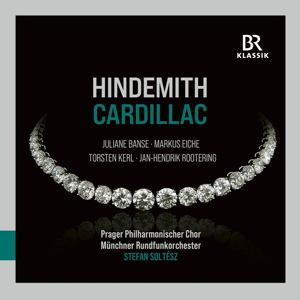
Paul Hindemith (1895-1963)
Cardillac (1926 version)
Cardillac’s Daughter – Juliane Banse (soprano)
The Lady – Michaela Selinger (soprano)
The Officer – Torsten Kerl (tenor)
The Courtier – Oliver Ringelhahn (tenor)
Cardillac – Markus Eiche (baritone)
The Provost Marshal – Kay Stiefermann (bass)
The Gold Merchant – Jan-Hendrik Rootering (bass)
Prague Philharmonic Chorus
Munich Radio Orchestra/Stefan Soltész
rec. live, 13 October 2013, Prinzregententheater, Munich, Germany
BR Klassik 900345 [2 CDs: 90]
BR Klassik’s new release of Hindemith’s fourth opera has been sitting in the archives for some time. This live recording has been issued in tribute to the conductor Stefan Soltész, who passed away quite suddenly in July 2022, after collapsing during a performance of Richard Strauss’ Die schweigsame Frau at the Bavarian State Opera.
This is only the second recording of Hindemith’s tale of the pathologically obsessed goldsmith Cardillac. The previous recording was made by the West German Radio in Berlin and was first released by DG in 1969. The opera is based on one of E.T.A Hoffmann’s better short stories Mademoiselle de Scuderi. The tale concerns the madness of the Goldsmith Cardillac, whose obsessive love for the jewellery that he creates causes him to murder those who purchase it from him.
At the moment these CDs have the field entirely to themselves as the 1969 recording is only available as a digital download. Happily, the new set is a fairly decent representation of Hindemith’s powerful score. This is ultimately a fine testimonial to the highly skilled Soltész, as he conducts the score with clarity and precision. He has the benefit of the excellent Munich Radio Orchestra, which has a long-established reputation for the quality of the playing from its members. Hindemith uses a large orchestra but rarely do they all get to play together. Episodes such as the famous Duet for two flutes, which accompany the first onstage murder, are executed immaculately in this live recording. The recorded sound flatters the orchestra which benefits from a much wider range of sound than the old DG recording, conducted by Joseph Keilberth. The Prague Philharmonic choir are also excellent and they are placed at an atmospheric distance which sounds wonderful but is no more successful at clarifying the choral lines than the older Keilberth set.
Markus Eiche sings the title character with a robust baritone that is thoroughly integrated throughout all registers. His rival on the older recording is Dietrich Fischer-Dieskau whose tone is often less full-bodied than Eiche’s, however; Fischer-Dieskau gives the more vivid psychological portrait of the Goldsmith. Torsten Kerl’s ringing tenor is most effective as the Office, while Oliver Ringelhahn also provides a characterful portrayal of the courtier, who ends up being Cardillac’s first victim. Jan Handrik Rootering’s secure bass is always a welcome contribution and he easily edges out his rival on the DG version.
When it comes to the female members of the cast, the honours are divided more equally between the two versions. As the Lady, Michaela Selinger produces rounded tone and her portrayal is definitely more the femme fatale that one would expect to find than does Elisabeth Söderström on the DG version. However; Söderström’s voice is lighter,purer, and endlessly fascinating to listen to. Juliane Banse’s soprano is firm-toned and evenly produced and she copes well with the vocal demands of Cardillac’s Daughter. For Keilberth, Leonore Kirschstein has more vocal brilliance but the choice is a fairly even match between the two singers.
The new recording comes with a booklet in German and English that contains an often impenetrable article about the opera and a brief synopsis. The DG release contained the full German libretto with an English translation. It would have made more sense for BR Klassik to re-licence the libretto to include it here. I also feel it worth mentioning that the choice of cover image of a diamond necklace has obviously been made by someone who did not bother to read the story of this opera. Hint…it’s about an obsessive love of gold.
Mike Parr
Help us financially by purchasing from




















